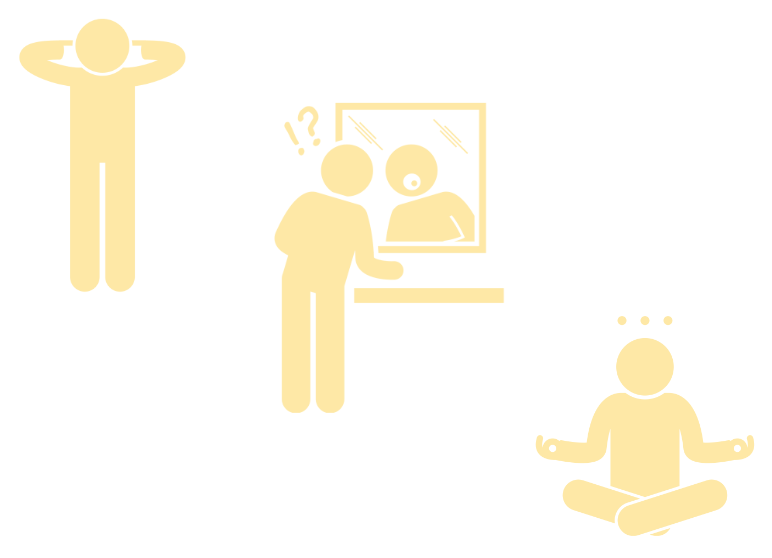Meet Andy.
In many ways, he had a typical childhood. He was taught to be respectful, work hard, earn good grades, and prepare himself to be successful later on in life.
So he did.
Andy was quite good at following the directions he was given by others. After all, he was punished whenever he didn’t listen to the adults in charge. So, he studied hard and earned straight A’s, was active in sports and school programs, and applied himself to the things he was told were important by his teachers, coaches, family, and the people he saw on TV.
By doing so he won lots of awards. People cheered him on for being the best at following what he was told to do.
Eventually, Andy graduated from college and got a job that was considered by others to be high paying and prestigious.
Andy was kind of a big deal. He climbed the ladder faster than others. He sometimes enjoyed the challenge of his work as well. But, eventually, Andy didn’t find the job as rewarding anymore. Sure, he made more money and had more responsibility, but that didn’t equate to more joy or life fulfillment.
That got him thinking…
“Hmmmm… I’m bored and kind of unhappy. Things are going well, but I’m just not inspired anymore. I have to force myself to go to work half of the time.”
“Maybe I should apply for that bigger role at that popular startup in SF. That’ll do the trick. That will get me excited again!” Yet there is still some uncertainty in his mind.
So, Andy reaches out to smart, successful people that are wealthier than him to ask for their advice. Surely, they’ll know what Andy should do. They are rich and Andy is not. Clearly, they know something he doesn’t…
The titans of his industry tell him to keep going, climb higher, jump on rocket ships, and shoot for the moon because that’s how they made it to the big time and got rich.
And like the good overachiever he was trained to be, Andy follows their advice and succeeds at getting the fancy job at the fancy startup. He’s a ladder-climbing machine.
A few years go by and Andy is even more successful now. More money. More titles. More adulation. He’s even been interviewed on a few podcasts, which is how you know he’s a big shot.
But Andy also has more stress. A lot more. And he’s packed on a few pounds around the waist. He doesn’t sleep as soundly as he used to either as he stares at the bags under his eyes in the mirror each morning.
That gut feeling of unfulfillment slowly returns — a 6th sense that something isn’t quite right. This time, that feeling is accompanied by anxiety and sadness.
Andy is confused. He thinks, “Wait…. I did everything I was supposed to do but I don’t feel right. What gives?! I earned good grades. I went to a great college. I followed Gary Vaynerchuk’s advice to be overcaffeinated and ambiguously motivational. I leaned in as Sheryl Sandberg told me to do. So why do I constantly feel like leaning out?”
Andy wonders where he should go next. “What would Reid Hoffman do?” He buys a few more books from titans of industry, seeking the path that he should follow.
Andy discovers all sorts of clever taglines in his search for the next ladder to climb, which will certainly solve his inner woes, he thinks.
“The secret of getting ahead is getting started.”
“When offered a seat on a rocketship, don’t ask what seat, just jump in.”
“You can’t climb the ladder of success with your hands in your pockets.”
“If opportunity doesn’t knock, build a door.”
Andy goes on like this for 10-15 more years, jumping from one job to the next, earning high pay, doing more podcast interviews, paying off his mortgage, and slowly building a nest egg so that he can retire at 55, which he does.
He drops some bills on some cool shit, like a boat. He takes it out for rides from time to time.
But the thrills quickly fade. As he gets a few months or years into retirement, he finds that he is mostly bored and has lost touch with the things that make him feel alive. So, most of the time he plops himself in front of a screen and drifts off into oblivion.
Eventually, Andy gets sick and dies. He pays for his slow death with the money he saved up while working.
The end.
Why you should never ask for career advice
Notice how Andy never figured out why he felt sad, anxious, and unfulfilled despite everything he accomplished. Also notice that he didn’t know what to do with his time and money when he retired, other than spend it on momentary pleasures.
Importantly, notice how Andy turned to others to tell him what to do with his career.
Think about that for a second. Why would he ask others what to do with his life?
The answer is simple: Andy wasn’t living for himself because he didn’t know himself.
And that’s how things go for most of humanity, including Andy and other high achievers like him.
I’ll tell you a quick story.
I was working at a startup and the CEO randomly bumped into me outside the office when I was heading out to coffee. He said, “Hey do you have a second?” To which I replied, “Sure! What’s up?” The CEO told me, “We’re promoting you to executive staff and we’d like to tell the company later this week. We think you’ve done a great job and want to bring you into the executive team.”
And just like that, I was a VP.
A few days later it was announced at our weekly all-hands company meeting. It felt great. Lots of people cheered. A few assholes that didn’t like me, and that thought they should be CEO of the company, sneered at the news. But, overall, it was a great show of support from my peers and I felt proud of everything I’d done to get to that point.
Then a peer of mine, a mid-level employee with multiple Ivy League credentials, asked me to chat. Later that day, we spoke outside for a few minutes and then he asked, “So how did you do it!? How did you become an exec?” The question was clearly stemming from his desire to become a VP someday. And it also revealed to me that he believed the path to becoming an exec was a political path of sorts — as if I played “the game” so-to-speak.
I responded, “Uhhhh I just put my head down and did my job. The CEO surprised me with it. I never once asked about a promotion or even suggested it to anyone. It just happened when I was going out to get coffee on Tuesday.”
He seemed baffled by it. It didn’t jive with his Harvard MBA mental model of career progression. We ended the conversation a few minutes later and went back to work.
I share this story because it reveals that my colleague wasn’t living for himself because he didn’t know himself. He was living for the next hoop to jump through as defined by society’s rules around building a successful life. He was actually better at following the rules than I was. Whereas I went to a 4-year public university, he went to an Ivy League school. I didn’t have any advanced degrees (and barely graduated from undergrad) but he was a 4.0 across the board at undergraduate and graduate levels.
Still, he was asleep in the sense that none of what he pursued was a goal of his own. Do you know how I know this? Because, despite everything he had already accomplished, he was still looking to make the next political move to climb the next rung on the ladder, and he was quite miserable the entire time he was doing it. But that didn’t stop him from doing more of the same shit that contributed to a life that he was clearly unhappy with.
So, why was he doing what he was doing if it made him miserable?
Simple answer.
That’s what he had been conditioned to believe was what he was supposed to do with his life. And he didn’t stop to question it.
As Joseph Campbell once said, “If you can see your whole life’s path laid out then it’s not your life path.”
Follow your own advice
As someone who occasionally invests in new startups, the best part of it is when I speak with an entrepreneur who is clearly building something that is aligned with who they are, what they care about, and the future they envision for themselves.
That’s why we find the stories of certain entrepreneurs more emotionally compelling than others. We know that they know who they are. We can see that they have aligned everything in their life to conform to who they are. They choose where to live, what to work on, who to be close to, and everything else based on a deep understanding and acceptance of themselves. We can feel how aligned they are, and it’s intoxicating.
For example, Evan Hafer from Black Rifle Coffee.
Or why we love writers who put pen to paper with an authenticity unmatched by their peers, such as Hunter S. Thompson. As he shared in the below interview,
“… I tried cab driving, working on the railroad… you know… I didn’t even get a job most of the time. I was fired from every job I had and evicted from every place that I lived…”
It wasn’t that he was lazy or incompetent. Hunter S. Thompson knew that the standard path was not the path for him. He tried the standard path but it didn’t suit him. Instead, he carved out his own and it led to the creation of a new form of journalism called gonzo journalism, and Hunter became one of the greatest American writers to have ever lived.
I don’t share these examples to imply that following your own path leads to success and fame as it did with Evan and Hunter. That’s not the point.
The point I am making is that the work you’re doing is likely the culmination of what everyone else thinks you should be doing, going back to the earliest years of conditioning you received in elementary school.
For those of you who are perfectly happy with the work you do and the life you have, that’s fantastic. Keep doing what you’ve been doing. I’m not here to disrupt a life that you are content with.
However, for those of you who find yourself internally unwell, despite all that you’ve achieved, it’s time to stop asking for career advice. It’s time you start living an examined life because the next promotion you receive isn’t the answer.
Who am I and what life do I want to have?
If you can answer those two questions, you’ll never need career advice from another person. After all, to ask for career advice is to ask another person how you should live your life.
By dedicating yourself to examining who you are, what you believe, and why you believe it, you can design a life for yourself that is absent of the outside influences which seek to constantly and surreptitiously decide your fate.
Let’s return to the story of Andy for a moment.
There was a point when he didn’t feel good inside and thought that another career move would do the trick. He was confused as to why he felt unfulfilled so he sought the guidance of a few very successful people around him.
He followed the advice he received. Andy climbed the ladder further. He made more money. Still, he felt incomplete inside. Something beyond his sensory perception and intellectual abilities was tugging at him, begging him to go another direction.
This time, he listened to that guttural tug. He didn’t ask for career advice. He stopped looking outside of himself entirely. The external noise went quiet. On this occasion, he turned inward and sat with himself to discover who he was and to unlearn all that he had been told was ‘right’ and ‘true’.
It was a struggle. Andy’s ego fought back at the assaults launched against it. It didn’t want to let go of the control it had over Andy. But the Andy underneath the over-achiever ego, the real Andy that was tugging at him, begging for him to take the reigns and head down a new life path, refused to back down. It knew that over-achiever Andy was going through life like a puppet controlled by an invisible master.
After a few years of turning inward, facing the hard questions that are the only questions in life that matter, Andy the over-achiever slowly died as it was critically examined into non-existence.
He came to realize the truth. Much of what he had done in his life, and what he believed, had been planted into his mind through societal inception. And, with this awareness, he knew that he could never go back to how things used to be. How could he return to a life of anxiety and sadness that sat upon a fraudulent foundation?
Andy broke free. “Fuck this shit!” he said.
He unlearned everything he was told to believe when he was younger. He appreciated how far it had taken him, but he knew it was time to leave that all behind.
Andy reconnected with the parts of him that had been suppressed after he was told by all of the adults that he had to get serious, focus on a linear life path of success, and move beyond childish dreams.
Slowly, the childlike wonder in him returned, along with the willingness to do things simply because he was drawn to them — as if it was always in him to do so.
Eventually, he decided that he would never return to how things were. Instead, inspired by his newfound freedom and the creativity that it unleashes, he decided to redesign his life around what he loves and the authentic parts of himself.
Andy made it his mission to meticulously design his life around what fulfills him, utilizes his inherent capabilities, and makes him feel most alive. That meant saying goodbye to the old notion of himself. He was going to move forward with a full embrace of his true desires.
That’s when Andy carved out a path of his own. It was difficult but rewarding. Some people were angry at him for doing so. Some didn’t want to talk to him again, but Andy was ok with that since they liked the old Andy, not the new Andy.
Others thought he had gone batshit crazy and was nuttier than squirrel turds. But Andy knew that he wasn’t and that they may never understand the change that has occurred within him. Andy is at peace with that so he leaves them behind.
He is on his own journey now. The days of asking for advice from others are gone because he knows that to do so would be to live his life according to other people’s desires. When he struggles to figure out what the next step is, he turns inward for advice on where to go next since he has become his own mentor.
And wouldn’t ya know it… the sadness and anxiety slowly drifted away. The constant stress, the need to climb the ladder, and the dull sense of unfulfillment were gone. It’s not that the new path Andy took was easy. Carving a new way is always hard. But this time, it was Andy’s way. And he’s at peace with that.
If this story hits close to home, I’ll say the following for you to consider.
Stop asking for career advice from others. By doing so, you’re allowing your life to be defined by someone else.
Examine who you are, why you believe what you believe, and why you’ve done what you’ve done. Don’t stop until you find the truth.
Once you discover what is true, your advice is the only advice you’ll ever need.
This is the way to self-mastery.
This is the way of the Buddha.
And this way can also be yours.



























Solid. Reading this late, but right when I needed it. I appreciate you for putting this out in the world. It matters.
Another great essay, Andy. So much of it resonates with me and has some similarities to the journey I am on. It's not an easy path, but certainly a rewarding one with more truth and joy (at least for me). I really like how you frame asking for career advice as asking for someone else to decide your life path. It's so true and I have several times received advice that is so counter to what I need and want and is mostly what society deems as the path to success: up, up and up the corporate ladder. Breaking free and unlearning this all is hard and I am still very a much at the beginning of this journey. Your writing has been a great inspiration to me along the way. Thank you.